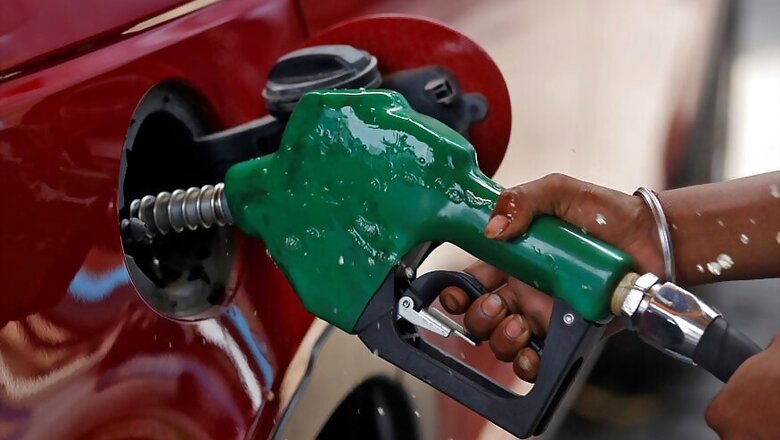
views
New Delhi: Within a day of the one-off excise duty cut and PSUs subsidising fuel, petrol and diesel prices are on the rise again and have hit a three week high.
Petrol and diesel prices were cut by a minimum Rs 2.50 on October 5 when the government's only second cut in excise duty of Rs 1.50 per litre and state-owned fuel retailers providing a Re 1 per litre subsidy came into effect. In BJP-ruled states, the reduction was higher as they matched the cut with a similar reduction local sales tax or VAT.
But the prices were on the rise from the very next day. Petrol price was hiked by 18 paise a litre on October 6 and 14 paise on Sunday, according to daily price notification issued by state owned oil firms.
Petrol, which in Delhi was cut to Rs 81.50 on October 5, on Sunday costs Rs 81.82. Similarly, diesel rates are hiked by 29 paise a litre each on October 6 and Sunday. It costs Rs 73.53 per litre in Delhi, up from Rs 72.95 on October 5, according to the oil firms.
Delhi, which did not cut VAT on fuel, still has the cheapest fuel in all metros and bulk of state capital as it levies lower taxes. Mumbai despite reducing VAT on petrol still has the highest priced fuel. Petrol in Mumbai sells for Rs 87.29 a litre on Sunday and diesel is priced at Rs 77.06.
Petrol prices had hit an all-time high of Rs 84 per litre in Delhi and Rs 91.34 in Mumbai on October 4. Diesel rates too had peaked to Rs 75.45 a litre in Delhi and Rs 80.10 in Mumbai.
Following the twin decision, they fell to Rs 81.50 per litre of petrol in Delhi and Rs 86.97 in Mumbai. Diesel rates fell to Rs 72.95 in Delhi and Rs 77.45 in Mumbai on October 5. On Sunday, the rates hit a three-week high.
Private retailers like Nayara Energy, formerly known as Essar Oil, too are matching PSU rates by subsidising fuel by Re 1 a litre. After the Centre cut excise duty by Rs 1.50 per litre and asked PSU oil firms to subsidise fuel by Re 1, Maharashtra and Gujarat governments were among the first to announce a matching Rs 2.50 cut.
They were later joined by Chhattisgarh, Jharkhand, Tripura, Uttar Pradesh, Madhya Pradesh, Himachal Pradesh, Haryana Assam, Uttarakhand, Goa and Arunachal Pradesh with similar moves. Jammu and Kashmir, which is under governor's rule, too reduced tax on the two fuel. Maharashtra, however, reduced VAT only on petrol and not on diesel.
Even before the excise duty cut, Rajasthan, West Bengal, Karnataka, Kerala and Andhra Pradesh had last month reduced VAT to cushion consumers for a spate of price increases.
The reduction in excise duty, only the second in four years of BJP-led NDA rule, will dent central government revenues by Rs 10,500 crore and was aimed at cooling retail prices that had shot up to an all-time high.
The BJP-government at the Centre had raised excise duty on petrol by Rs 11.77 a litre and that on diesel by Rs 13.47 a litre in nine installments between November 2014 and January 2016 to shore up finances as global oil prices fell, but then cut the tax just once in October last year by Rs 2 a litre.
Prior to Friday's cut, petrol price had risen by Rs 6.86 a litre and diesel by Rs 6.73 since mid-August - the most in any six-week duration after the daily price revision was introduced in mid-June last year.
Industry sources said for state-owned fuel retailers absorbing Re 1 per litre price would mean a Rs 9,000 crore hit on profits on an annualised basis. For the remainder of current fiscal, it would be Rs 4,500 crore, with IOC's share being roughly half and the rest is split equally between HPCL and BPCL.
Almost half of the fuel price is made up of taxes. The Centre, prior to the excise duty cur, levied a total of Rs 19.48 per litre of excise duty on petrol and Rs 15.33 per litre on diesel. On top of this, states levy value-added tax (VAT).
The hike in duties in 2014-16 had led to excise collections from petro goods rising from Rs 99,184 crore in 2014-15 to Rs 2,29,019 crore in 2017-18. States saw their VAT revenue rise from Rs 1,37,157 crore in 2014-15 to Rs 1,84,091 crore in 2017-18. night.




















Comments
0 comment